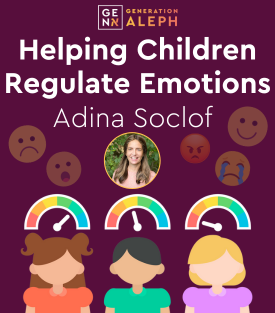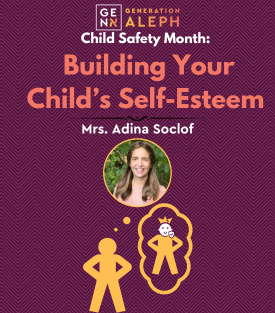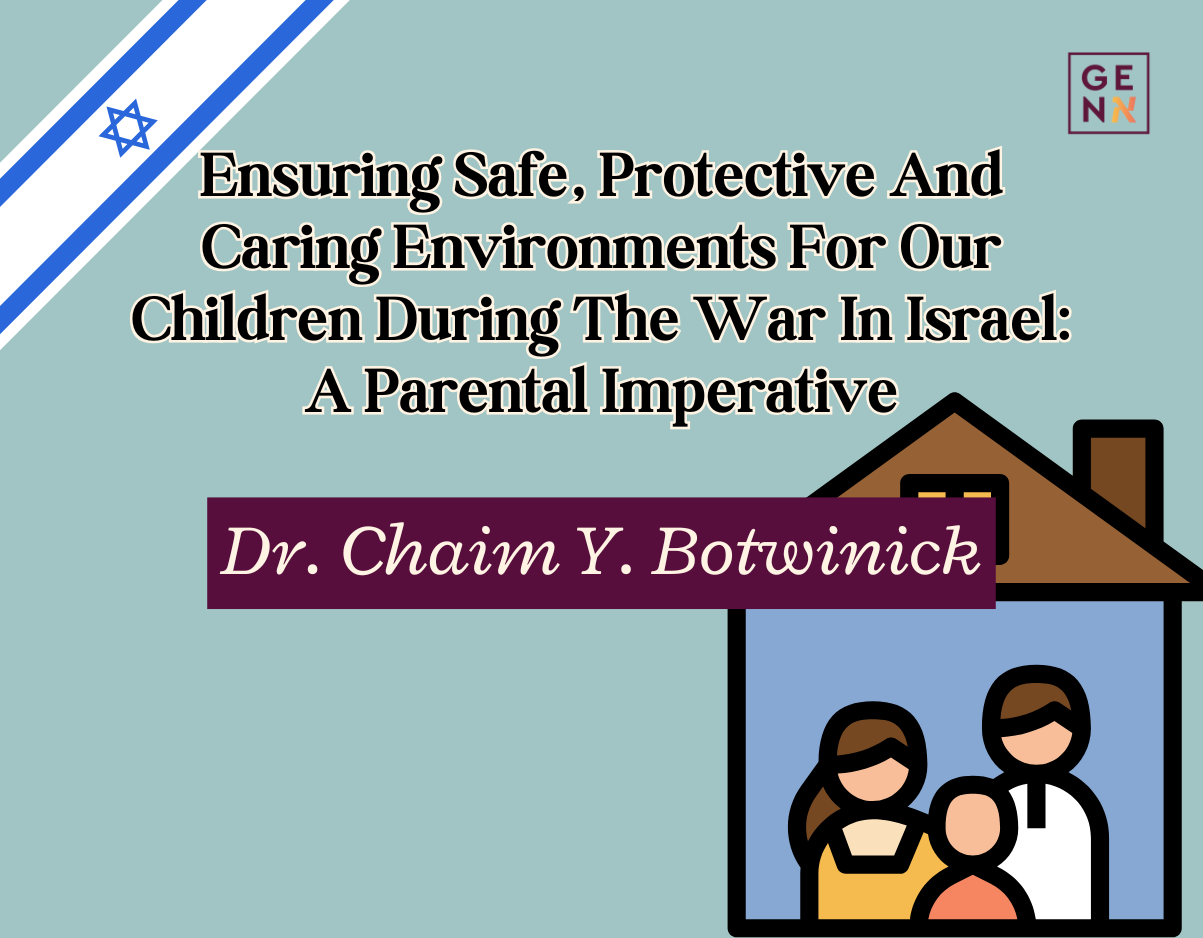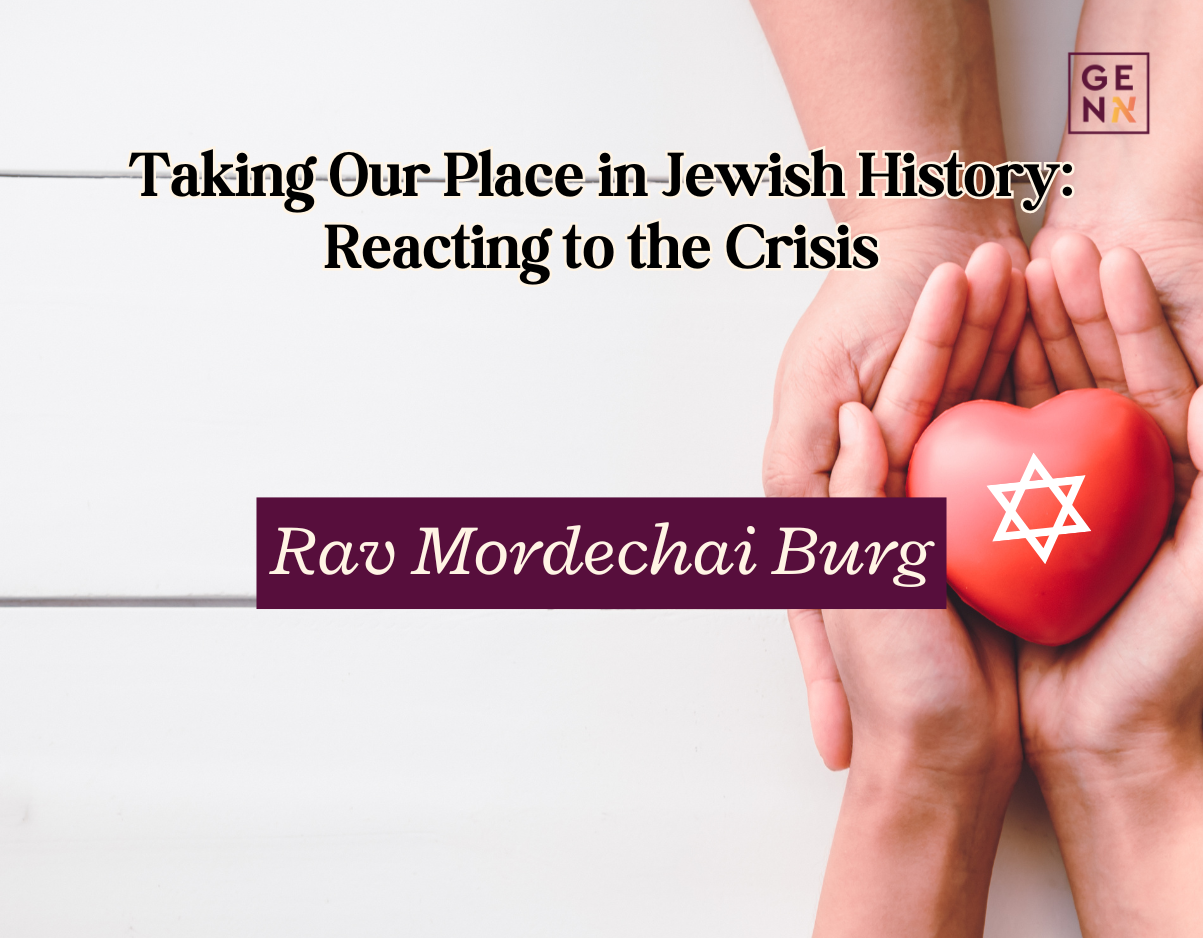Last week I had the distinct privilege of attending a two day IFS (Internal Family Systems) parenting training seminar taught by the world renowned Dr. Einat Borenstein. IFS makes the distinction between self (the Godly spark that truly defines us) and parts (subpersonalities that manage and protect us from our exiled pain). One of the core features of being “in self” is presence and if Einat is anything she is presence personified. There is a certain aura about her that for me felt very centering. Having never met Einat before I was immediately struck by her command of the room. She did not need to be loud or charismatic (though she is certainly the latter), she had our attention immediately. Einat began our session by taking a moment to recognize the war that we are currently fighting. Her words struck me deeply. “We are taking our place in Jewish history.”
I have spent a lot of time unpacking that phrase. Why did it touch me as deeply as it did? What does it mean for us as people and as parents to take our place in Jewish history?
For me the word that keeps coming up is disoriented. As the saying goes, I find myself homesick for a place that no longer exists. For many of us the map of day to day life has been lost. We now occupy a “liminal space”. For those who are not familiar with the word liminal here is the wikipedia definition. “Liminality is the quality of ambiguity or disorientation that occurs in the middle stage of a rite of passage, when participants no longer hold their pre-ritual status but have not yet begun the transition to the status they will hold when the rite is complete.” We are in the process of crossing over into a new reality and new maps have not yet been drawn up. The routines that reflected and supported our identity, routines that anchored us in the predictable and the secure and the comfortable, routines that expressed the meaning we make of our lives, have been largely lost. Will we have to leave work early to go to the funeral of a fallen soldier? Can we feel safe taking a business trip abroad? How can I help the displaced family from the south who moved in next door feel comfortable and settled in? How do I feel about the ceasefire?
Children are little people. They are also crossing over into this new liminal space. And if we pay attention we can also see their vulnerability. Questions like, can I go to visit a friend in…? Is it safe to take a bus? Watch their faces as a siren goes off, as they hear the booms overhead or in the distance. Notice their posture when they sit in a Miklat. We are all struggling to find our footing. We stand in the unknown and the path forward feels unsure and unsafe. As a country, as a people, we are eminently aware of our vulnerability. The question is what do we do now? For ourselves and for our children, how can we feel a little less adrift?
There are only ever two choices; we can turn towards or turn away. Viktor Frankl wrote of his experience in the concentration camp, “…there were always choices to make. Every day, every hour, offered the opportunity to make a decision, a decision which determined whether you would or would not submit to those powers which threatened to rob you or very self, your inner freedom…” Now as then we have decisions to make. Physician, psychiatrist, meditation teacher, and author Jeffrey Brantley wrote, “We can turn away from our own deep pain, seeking relief from distraction, numbing, and denial. Or we can turn toward the pain with compassionate attention and willingness to allow what we are feeling to be just as it is.” I think this is why Einat’s opening remarks struck me so deeply. I, like many, have been in crisis mode. In crisis mode, I generally numb out. Important things have to get done and my own pain cannot be the focus. Fixating on work may give me the illusory feeling of control and maintain my sense of self but it is a far cry from actually being in self. We are taking our place in Jewish history. A simple yet powerful statement that called me back into reality and reoriented me. I am not adrift, I am part of a four thousand year old story. We are a people who have consistently occupied liminal spaces. Expelled from one land to another, we are a people of rupture and repair. I may not know the path forward but neither did those who came before me. Put simply, I feel a little more comfortable in this new space we are building.
But it is not only about location, it is also about agency. Like my ancestors, it is my turn to choose how to respond to this latest crisis. In crisis, when it is appropriate, we have the opportunity to ask of the crisis, what are you here to teach me? As Holocaust survivor Dr. Edith Eger so eloquently puts it, “Survivors don’t have time to ask, ‘Why me?’ For survivors, the only relevant question is, ‘What now?’” At the end of this I do not want to say, I worked hard to numb my pain. I want to choose to make meaning of this pain from a deep sense of self. Doctors Elisabeth Kübler-Ross and David Kessler wrote, “The most beautiful people we have known are those who have known defeat, known suffering, known struggle, known loss, and have found their way out of the depths. These persons have an appreciation, a sensitivity, and an understanding of life that fills them with compassion, gentleness, and a deep loving concern. Beautiful people do not just happen.” At the end of this war we will heal. We may not be the same but who would want to come out of this the same. If we operate from self we have the opportunity to learn invaluable lessons. Undoubtedly as part of our grieving process we will grapple with profound feelings of sadness and loss. With courage we can explore the impact of our vulnerability. Ultimately, if we so choose, this process can strengthen our sense of self, adding depth and wisdom to the meaning of our current experience and our lives.
Which brings me back to parenting. As a parent we want to help our children adjust to this new space and choose what meaning they want to make for themselves from this war. We are not in control of our children but we can choose how we show up and exert influence over our home. Our best shot for our children to discover a deep sense of self is to live (and parent) from a deep sense of self. If we show up with presence, our children will see us not as people who are adrift in the sea of vulnerability but as people who are taking their place in Jewish history. And perhaps that will give them permission to do the same. We can teach our children to un-blend from their parts; a part of them may be scared and that’s ok and understandable and yet their self remains calm, confident and courageous. Our homes can be an environment where all parts of ourselves (and our children) are welcome and that the self can, with compassion and gratitude, tend to the needs of our parts. We can openly discuss our beliefs around vulnerability and discover the perspective of the self that teaches us that vulnerability is not weakness but the birthplace of connection.
In Judaism parenting is about preparing our children to be the next link in the chain. If we take our place in Jewish history, if we show up in self and lead from the inside out, we role model for our children how one day they can take their place in this four thousand year old story. In times such as these I can think of no more noble mission.
Rav Mordechai Burg is the Menahel of Mevaseret, Mashpia of NCSY Summer, Mashpia of Nitzotzos, author of Nitzotzos on Chumash and a senior Rebbe at Tomer Devorah and Bnot Torah Institute. His shiurim can be found on Nitzotzos.com.
Submit your questions
"*" indicates required fields











